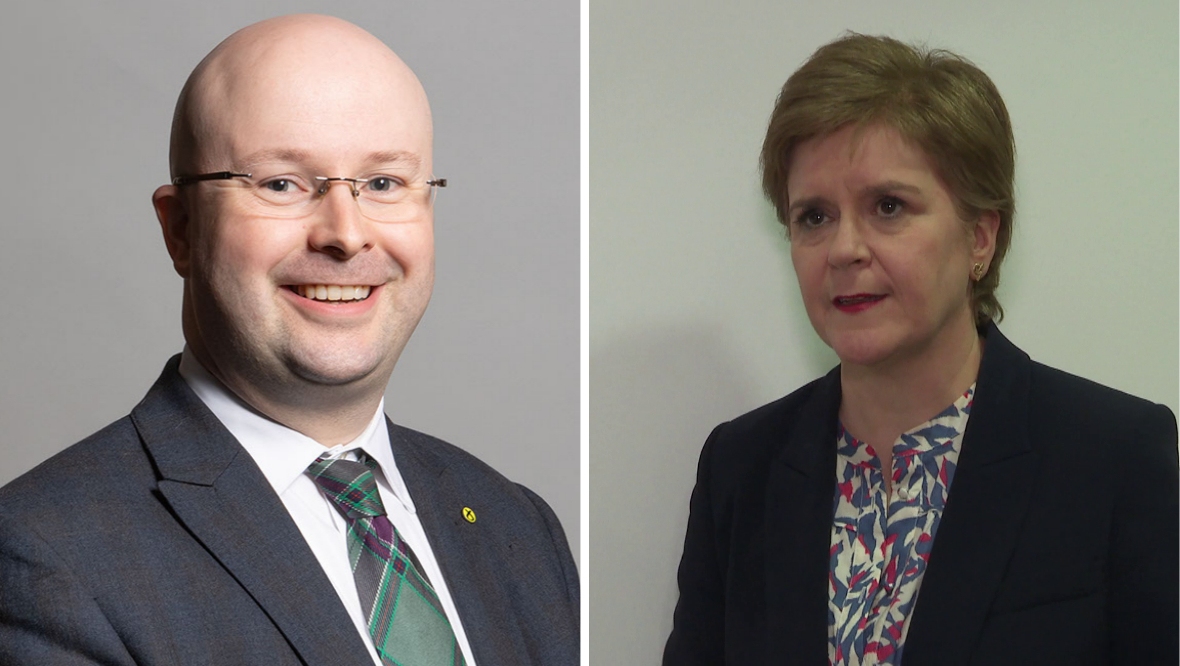It is an issue that the SNP simply cannot draw a line under: the fallout from the sexual misconduct finding against Glasgow North MP Patrick Grady.
To recap briefly. An independent probe found that Grady had harassed a staff member in 2016 by touching him inappropriately. Grady was suspended from the Commons for two sitting days.
Meanwhile, the victim in this case has accused the SNP of not taking the issue seriously and he has had some harsh words for not only Grady but the for the party’s Westminster leader Ian Blackford.
Blackford, who has been unusually quiet this week as the furore over Grady’s behaviour refuses to go away, appears to have compounded the SNP’s difficulties by urging MPs to get behind Grady.
A leaked recording of a meeting of the SNP parliamentary group appears to demonstrate that the victim was an afterthought as MPs applauded their support for Grady.
That action was condemned by the First Minister today at Question Time. It is unusual for a party leader to condemn colleagues so unambiguously, but that is what she did today under questioning from the Scottish Conservative leader Douglas Ross.
Sturgeon described the actions of her MPs as unacceptable and told the chamber she had written to the victim and had offered to meet him in order that she can fully understand his position. She said that victims had a right to be heard and have their concerns addressed.
The exchanges between the First Minister and Ross and later Anas Sarwar, the Scottish Labour leader, were restrained. All were cognisant of the fact that an intemperate rammy would look bad given the subject matter being discussed.
Ross, quietly but effectively, read out comments made by the victim this morning in which he made clear he thought the SNP were more interested in self-preservation than dealing appropriately with his complaint.
Sarwar went further in his charge sheet against the SNP, saying that the way in which the Grady affair had been handled was yet another example of “a culture of secrecy and cover-up with this government”.
In a tone of repeated contrition, the First Minister said that she did take allegations seriously, but the issue of harassment was wider than affecting just one political party.
She mentioned the scrutiny that had attracted to her when she refused to sweep allegations about her predecessor under the carpet, contending that she had always done the right thing when allegations emerge.
Sarwar wanted to know why any harassment claims against Scottish Ministers were not made public. The First Minister said this was not possible for legal reasons, something that made her uncomfortable.
She told MSPs that fresh advice meant that the government could find a way of making future complaints more transparent, although such a move would not be applied retrospectively.
It is stating the blindingly obvious that allegations of inappropriate behaviour and of sexual misconduct are made against elected members of all political parties at different times.
Grady’s punishment for his behaviour was to be suspended from the Commons for two working days, something described by Ross as “an insult”.
Two issues stand out in this case. Are the SNP’s procedures fair when it comes to people having confidence that their concerns will be dealt with properly? It appears not, which is why a probe into their grievance procedures is now underway.
The second issue is whether the punishment or sanction when a guilty finding is established is proportionate. Clearly the SNPs opponents think that is not the case with Grady, but it should be pointed out the sanction arrived at was the recommendation of a procedure all the parties at Westminster support.
There are two by-elections taking place today in England, one because a Tory MP watched pornography in the Commons chamber and another involving an MP convicted of sexual assault by a court. In both cases, their behaviour proved to be career ending.
There is no consensus on what is proportionate in this case, The First Minister points to an independent process at Westminster having made a decision on Grady.
Clearly both Labour and the Conservatives believe he is unfit to represent his constituents and should resign. The comments made by Blackford at the SNP group meeting have led calls for him to quit as well.
Plainly, these issues should not involve party politics. The anguish of victims should rise above politicians playing a blame game, but the crude reality is that since it is often the conduct of leaders that comes under scrutiny, they end up, in part, being party political.
The SNP would have hoped perhaps even expected that the Grady affair would die with his Commons suspension but that is simply not the case.
The fallout has ensnared Blackford and indeed one of his MPs has apologised for her comments at the group meeting accepting that they were insensitive in that it appeared to say the victim counted for little.
We will probably hear more from the victim, which means that the fallout from this incident has still some way to run, all of which means more uncomfortable days ahead for the party hierarchy.
Follow STV News on WhatsApp
Scan the QR code on your mobile device for all the latest news from around the country


 Parliament UKSTV News
Parliament UKSTV News

























